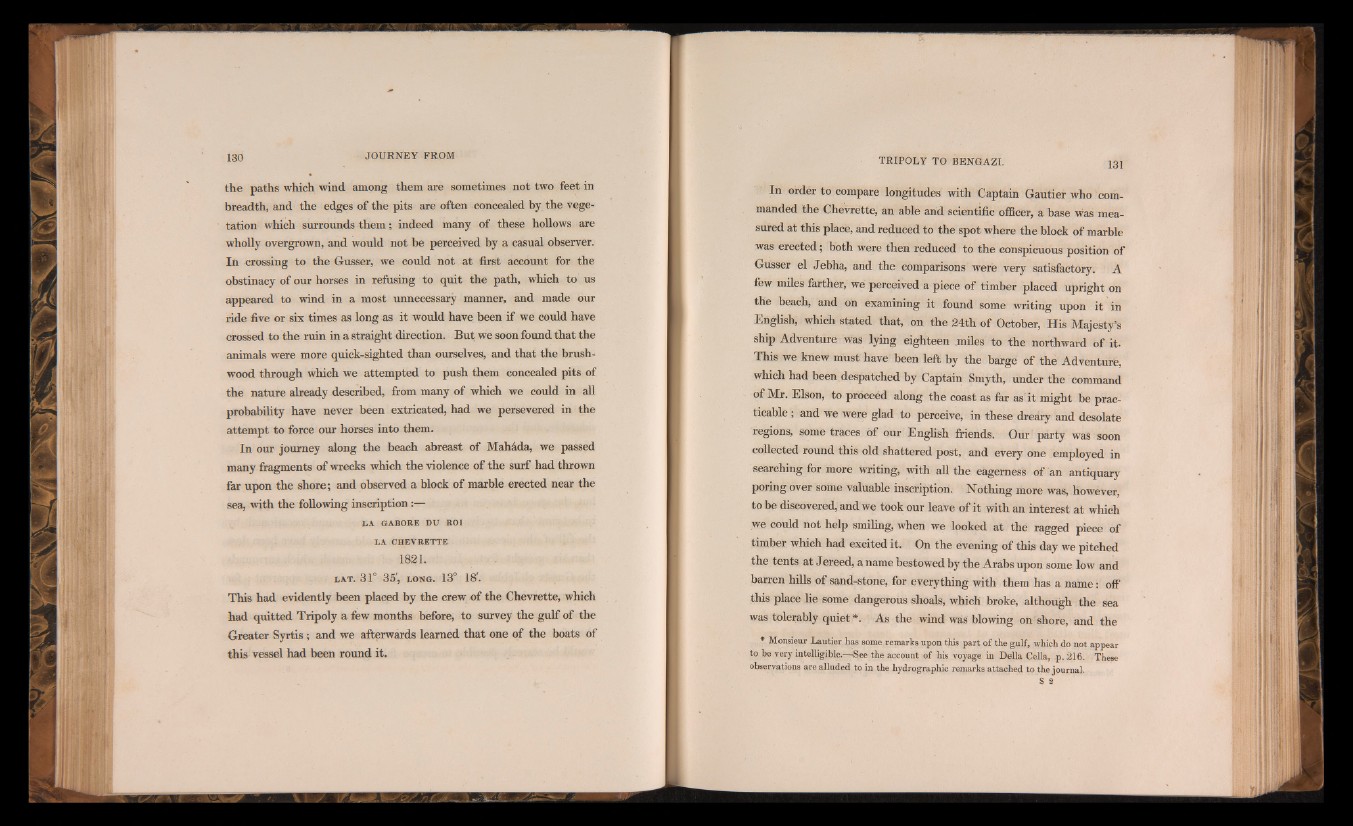
the paths which wind among them are sometimes not two feet in
breadth, and the edges of the pits are often concealed by the vegetation
which surrounds them; indeed many of these hollows are
wholly overgrown, and would not be perceived by a casual observer.
In crossing to the Gusser, we could not at first account for the
obstinacy of our horses in refusing to quit the path, which to us
appeared to wind in a most unnecessary manner, and made our
ride five or six times as long as it would have been if we could have
crossed to the ruin in a straight direction. But we soon found that the
animals were more quick-sighted than ourselves, and that the brushwood
through which we attempted to push them concealed pits of
the nature already described, from many of which we could in all
probability have never been extricated, had we persevered in the
attempt to force our horses into them.
In our journey along the beach abreast of Mahida, we passed
many fragments of wrecks which the violence of the surf had thrown
far upon the shore; and observed a block of marble erected near the
sea, with the following inscription:—
LA GABORE DU ROI
LA CHEVRETTE
1821.
LAT. 31° 35', LONG. 13° 18'.
This had evidently been placed by the crew of the Chevrette, which
had quitted Tripoly a few months before, to survey the gulf of the
Greater Syrtis ; and we afterwards learned that one of the boats of
this vessel had been round it.
In order to compare longitudes with Captain Gautier who commanded
the Chevrette, an able and scientific officer, a base was measured
at this place, and reduced to the spot where the block of marble
was erected; both were then reduced to the conspicuous position of
Gusser el Jebha, and the comparisons were very satisfactory. A
few miles farther, we perceived a piece of timber placed upright on
the beach, and on examining it found some writing upon it in
English, which stated that, on the 24th of October, His Majesty’s
ship Adventure was lying eighteen .miles to the northward of it-
This we knew must have been left by the barge of the Adventure,
which had been, despatched by Captain Smyth, under the command
of Mr. Elson, to proceed along the coast as far as it might be practicable
; and we were glad to perceive, in these dreary and desolate
regions, some traces of our English friends. Our party was soon
collected round this old shattered post, and every one employed in
searching for more writing, with all the eagerness of an antiquary
poring over some valuable inscription. Nothing more was, however,
to be discovered, and we took our leave of it with an interest at which
we could not help smiling, when we looked at the ragged piece of
timber which had excited it. On the evening of this day we pitched
the tents at Jereed, a name bestowed by the Arabs upon some low and
barren hills of sand-stone, for everything with them has a name: off
this place lie some dangerous shoals, which broke, although the sea
was tolerably quiet*. As the wind was blowing on shore, and the
* Monsieur Lautier has some remarks upon this part of the gulf, which do not appear
to be very intelligible.—See the account of his voyage in Della Celia, p. 216. These
observations are alluded to in the hydrographic remarks attached to the journal.